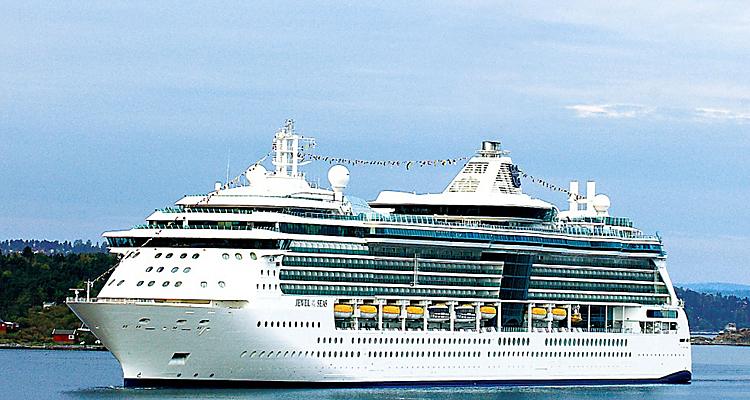Image courtesy of Royal Caribbean International https://www.royalcaribbean.com/cruise-ships
Cruises are growing in popularity, covering a few day or weeks or longer.
Cruise populations are generally older than the normal UK population. As a result both the incidences of acute and chronic conditions can be high. The most commonly reported health problems are respiratory tract infections, injuries, motion sickness and gastrointestinal illness. The relatively closed and crowded environment of a ship can facilitate the spread of disease, with Port visits having the potential to lead to exposure to infections which may be tropical in nature, which passenger immune systems may not be prepared.
So talk to your travel health professionals before you leave. Here are some things to consider.
Medical departments on board
All cruise ships have a medical department with trained staff. Primary and emergency care is provided, but it is unlikely to have a fully equipped hospital for in-patient care. Seriously ill or injured passengers may be evacuated off the ship either by helicopter, or at the next available port.
Medicines
It is important that individuals bring their own regular medications with them, enough to cover at least the duration of the trip. Bring a copy of any current repeat prescriptions in case you need to obtain more. Any medicines will be via a cruise or port doctor and will be obtained/paid for privately or via your travel insurance
Insurance
Having appropriate travel insurance is very important and this should cover repatriation.
Travel Vaccinations
Cruises tend to be low risk and may not need complicated vaccination schedules are usually unnecessary unless overnight stay on land or risky shore visits/activities such as treks are anticipated.
Travel healthcare professionals will be able to advise on any requirements.
In addition, even if not at risk of yellow fever during port calls, there may be a yellow fever vaccination certificate requirement for that country as a general entry requirement.
Many cruise companies may insist on a yellow fever vaccination and certificate before travelling. We have seen such requirements on ships leaving Florida in the USA. Your cruise company will issue this information as part of a pretravel pack if it is required.
During the risk assessment the travel health specialist will need to consider all countries to be visited, and importantly, the order in which they are visited. The mosquito that spreads yellow fever bites during the day, so day excursions in risk areas may necessitate vaccination.
Flu vaccinations
Flu is a recognised problem on cruises where large numbers of people are living in close proximity. Vaccination should be considered especially for the elderly and others with underlying medical conditions. For these groups pneumococcal vaccine may also be considered if not received previously.
Malaria
Where there are multiple destinations, each port must be assessed in turn for malaria risk. The malaria risk is normally very small in ports of Central and South East Asia, and South and Central America.
Overnight exposure is unusual (as the ship is normally back at sea) therefore many cruise travellers will not need antimalarial chemoprophylaxis although advice on awareness of risk, avoidance of mosquito bites, and prompt diagnosis of fever will still be required. See Global Health Travel blogs for bite prevention strategies.
The risk of malaria may be significant when entering ports in infected countries in sub-Saharan Africa especially if berthed overnight.
Mosquito bites should be avoided not just to reduce the risk of malaria but of other diseases such as dengue fever and zika virus. Accommodation on cruise ships is usually excellent with air-conditioning and well screened lounges and bars etc.
Gastroenteritis and Norovirus
Gastroenteritis is a risk due to the very close proximity of passengers. The risks can be reduced by strict personal hygiene measures such as regular hand washing and the use of alcohol gels.
It is essential to report any episodes of diarrhoea or vomiting immediately to the medical team on board to help prevent onward transmission to other passengers and crew.
Norovirus is a major cause of acute gastroenteritis and diarrhoea.Norovirus circulates widely in the population and outbreaks can occur in semi closed communities such as on a cruise ship. Usually spread from person to person or from contaminated surroundings. Once infected symptoms usually occur within 15 to 48 hours. Symptoms include vomiting, diarrhoea, nausea and stomach cramps. Vomit is highly infectious and can contaminate the environment creating an infection risk for others. Risk of transmitting norovirus is highest during early phase of illness and becomes less after 48hours. There is no specific treatment other than relief of symptoms and rehydration.
Promotion of scrupulous personal hygiene and isolation in own cabin until clear of symptoms for 48 hours will be advised; some cruise companies will also isolate the cabin companion. Global Health have a number of blogs which explain how to wash hands correctly.
See https://www.rpharms.com/resources/essential-guides/handwashing
Environmental Risks
Travellers can be exposed to extremes of heat and cold depending on itineraries. Suitable clothing is advised. Sun exposure may be under estimated on a ship especially with the cooling effect of sea breezes. Protective measures such as covering up and the use of a high factor sunscreen are advised.
Sexual Health
Increased alcohol can result in risk-taking behaviour, increasing the risk of sexually transmitted infections. Moderation of alcohol and safe sex practices are advised.
Zika is now widely spread across certain parts of the world via mosquitos and can then be transmitted sexually. If you are visiting these areas practice safe sex to avoid any risk of pregnancy. This also applies to males travelling alone as the risk can be passed to partners on return.
For more information visit https://www.nhs.uk/conditions/zika/

